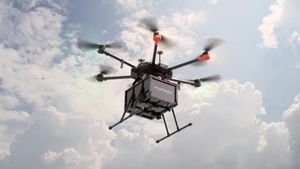Ukrainian drone strikes on Russian oil refineries have sparked renewed tensions as the war between the two countries enters its third year. Recent attacks, particularly targeting facilities like the Volgograd oil refinery—one of Russia's largest—underscore Ukraine's strategic aim of disrupting Russian military logistics.
Last weekend, the Volgograd refinery was hit by drone fragments, leading to localized fires, according to Andrei Bocharov, the region's governor. He described the incident as part of a "massive attack with fixed-wing drones," adding, "Most of the drones were intercepted and neutralized. There were no casualties." The Russian defense ministry reported it had shot down 70 Ukrainian drones over six regions, including Volgograd and adjacent areas.
The latest assault on the refinery, which processes approximately 6% of Russia's oil, occurred late Sunday, merely three days after another strike on the same facility. This continuous targeting of energy infrastructure reflects Ukraine's strategy of inflicting damage on Russia's energy supply, which is pivotal for funding its military efforts.
Ukrainian officials confirmed their forces attacked the Volgograd refinery alongside making attempts on other strategic sites such as gas processing plants. A member of Ukraine’s Security Service indicated these attacks aimed to disrupt the Russian war machine and represent the security agency's fifth successful operation behind enemy lines this year.
The strikes have drawn significant international attention as they highlight the intensifying conflict and the shifting dynamics of warfare, with drones playing a prominent role. Ukrainian long-range drones have reportedly improved their capabilities, allowing them to cover more distance and carry heavier payloads.
A press report noted the response from Russian authorities, stating they managed to down multiple drones, including 25 targeted over Volgograd. Consequently, airports across southern Russia temporarily halted operations due to the threats posed by incoming drones, causing disruptions in air travel.
Governor Igor Babushkin of the Astrakhan region acknowledged the drone strikes, mentioning they targeted energy infrastructure, contributing to fears over the safety of these facilities. He confirmed operations at one major gas processing plant—the primary supplier of sulfur for explosives—had been shut down as part of precautionary measures.
These drone strikes signal not only the immediate dangers for Russian military logistics but also mark Ukraine's tactical adaptation and resilience amid increasing pressure. The war, now entering its third year, continues to shape both nations' military strategies, bringing about changes to their operational approaches.
Experts assert these developments indicate Ukraine's commitment to defending its sovereignty by any means necessary, emphasizing the importance of long-range capabilities as they respond to the enduring Russian offensive, particularly along the eastern front.
The targeting of the Volgograd refinery and other strategic locations serve as reminders of the conflict's escalatory nature and the potential for wider ramifications. With both sides entrenched, the stakes remain high for all involved.



